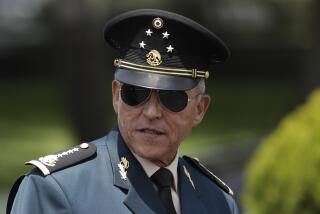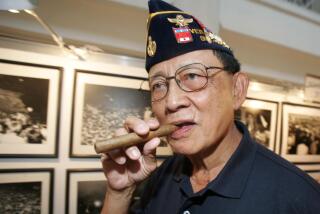Dinner Tonight!
- Share via
Horacio “Rivets” Rivero, the Navy’s first four-star admiral of Latino descent and the U.S. ambassador to Spain during the waning years of Francisco Franco’s regime, has died. He was 90.
Rivero died Sunday at his home in Coronado, Calif., where he had moved to retire among his Navy “extended family.”
A fourth star was pinned on Rivero’s shoulder boards in 1964, making him unofficially the first Latino to reach that rank.
Some historians consider him the second. The first Latino admiral in the U.S. Navy was David G. Farragut, who uttered the immortal line, “Damn the torpedoes! Full speed ahead!” But when Farragut, the son of an immigrant from Spain, became an admiral in 1866, the rank did not have as many divisions. Rivero had to rise from rear admiral with one and two stars, to vice admiral with three, and finally to admiral with four.
“Adm. Rivero was the kind of officer who was an inspiration to everybody,” said retired Vice Adm. Jerry Miller, a former executive assistant to Rivero. “He did it with courtesy, humor and with brains.”
Growing up surrounded by water in his native Puerto Rico, Rivero always longed to go into the Navy. He won an appointment to the U.S. Naval Academy in 1927 after two leading candidates from his small hometown of Ponce failed the entrance examination.
Annapolis was where Rivero earned the nickname that followed him around the world. His surname Rivero was duly stenciled on his Academy jumpsuit, but the rifle he was holding obscured a couple of letters.
“What’s your name?” growled a lieutenant. “Rivets?”
Graduating in 1931, third in his class of 441, Rivero became a specialist in ordnance engineering and, later, nuclear weapons.
During World War II he served as a gunnery officer aboard the cruisers San Juan and Pittsburgh in the Pacific, earning a Bronze Star. In the Korean War, he commanded the amphibious transport Noble. By the time of the Cuban missile crisis in October 1962, he was commander of amphibious forces for the Atlantic Fleet.
Known for wry understatement years after he was nearly killed by a diving Japanese kamikaze pilot, Rivero in 1986 described naval warfare: “You steam and steam and nothing happens. Then if something happens, it doesn’t take long.”
As a nuclear weapons expert, Rivero was privy to the Manhattan Project. After the war he worked on atomic bomb tests on the Pacific islands of Bikini and Eniwetok.
“Everyone was awed by the phenomenon,” he said of the tests decades later. “But you expected it. That is how it was supposed to be.”
From 1961 to 1968, Rivero was vice chief of naval operations, the Navy’s No. 2 post.
He spent his last four years in uniform as commander of Allied Forces in Southern Europe for NATO. In that capacity, he paid a courtesy call on Franco, knowing the military dictator was usually dismissive. But Franco talked with him for 45 minutes, an incident Rivero credited with leading to his appointment as U.S. ambassador to Spain.
He served two years in the diplomatic post. Rivero visited all 50 of Spain’s provinces and became well acquainted with then Prince Juan Carlos de Borbon, to whom Franco delegated his powers on July 19, 1974.
In retirement, Rivero served as an advisor to the chief of naval operations, the Naval Academy and the Naval War College. In San Diego, he was president of the World Affairs Council, and occasionally reviewed books on naval history for the San Diego Union-Tribune.
“I was sorry I had to retire,” he said in 1986. “I’d like to start all over. The Navy was my life.”
Rivero is survived by his daughter, Mary Lynn Hogan, of Bellevue, Wash., and two sisters in Puerto Rico.
More to Read
Sign up for Essential California
The most important California stories and recommendations in your inbox every morning.
You may occasionally receive promotional content from the Los Angeles Times.










